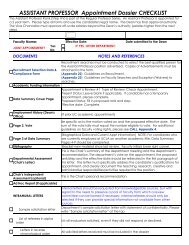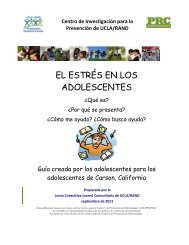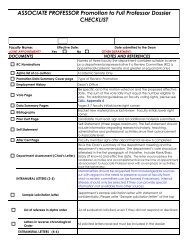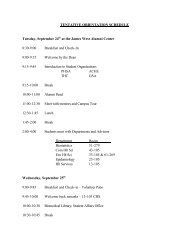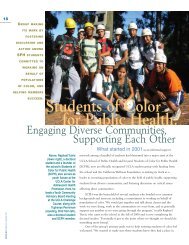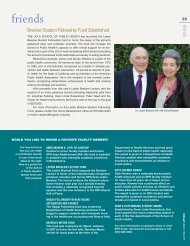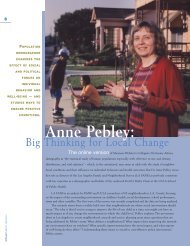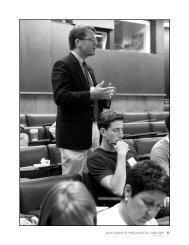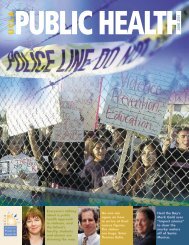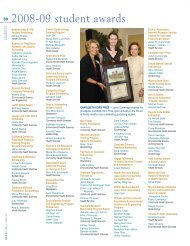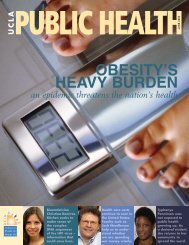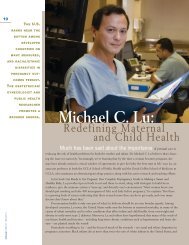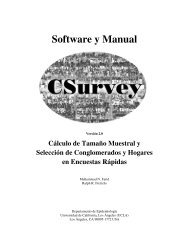UCLA PUBLICHEALTH SPRING 2000 - UCLA School of Public Health
UCLA PUBLICHEALTH SPRING 2000 - UCLA School of Public Health
UCLA PUBLICHEALTH SPRING 2000 - UCLA School of Public Health
You also want an ePaper? Increase the reach of your titles
YUMPU automatically turns print PDFs into web optimized ePapers that Google loves.
So much has happened to the public health landscape<br />
since 1985. “Back then, we as a field were still trying to<br />
be recognized as an important group in the health care<br />
arena,” Afifi says. “Today, everyone is mouthing the<br />
words ‘population-based paradigm.’ ” The major health issues<br />
<strong>of</strong> the past 15 years have only served to underscore the<br />
value <strong>of</strong> the public health approach. AIDS...cancer...health<br />
care financing...environmental toxins...the role <strong>of</strong> behavior...all<br />
issues in which public health plays a critical role.<br />
“We’ve entered the third wave <strong>of</strong> public health,” Afifi<br />
says. “The first was recognizing and controlling infectious<br />
diseases. The second, beginning in the middle <strong>of</strong> the 20th century,<br />
was more concerned with chronic diseases. Today we<br />
are seeing a greater focus on the role <strong>of</strong> behavior in health.”<br />
Looking ahead, Afifi predicts that fundamental changes in<br />
the area <strong>of</strong> health care financing will finally come to fruition<br />
within the next few years. “A new president will be coming in,<br />
and businesses are going to want to find a major solution,” he<br />
says. “I can’t predict what the change will be, but I do think<br />
there is an urge to get something done.” New issues are also<br />
emerging. With the Human Genome Project nearing completion,<br />
Afifi says, “public health will have to grapple with how<br />
to handle all <strong>of</strong> the ethical and health issues raised by this new<br />
information we will have about the role <strong>of</strong> individual genes.”<br />
Internationally, poorer countries already experiencing the<br />
“transitional double burden <strong>of</strong> disease” — growing rates <strong>of</strong><br />
chronic illnesses on top <strong>of</strong> continuing problems with infectious<br />
diseases — are facing a third burden. “They’re asking<br />
themselves, ‘How can we worry about improving the environment<br />
when our main concern is to feed the population?’ ”<br />
Afifi says.<br />
As for his own future, Afifi, who will remain on the<br />
school’s faculty, will first take a sabbatical. “During<br />
that year I will spend a lot <strong>of</strong> time catching up with the<br />
literature, mainly in biostatistics but also in broader<br />
areas <strong>of</strong> public health,” he says. Afifi also plans to devote<br />
more time to personal pursuits, including photography and<br />
his studies <strong>of</strong> music theory and composition structure.<br />
Reflecting on the past 15 years, Afifi says certain moments<br />
always brought him great satisfaction: making a congratulatory<br />
call to an assistant pr<strong>of</strong>essor who had just received<br />
tenure; being approached at a national meeting by a colleague<br />
who expressed admiration for the school; seeing the<br />
excited faces <strong>of</strong> incoming students at orientation; and seeing<br />
those same students at graduation ceremonies, knowing that<br />
the school had met their expectations.<br />
“I’ve devoted a big chunk <strong>of</strong> my life to serving this school,”<br />
Afifi says. “In 1985 I could have happily continued to teach<br />
and do research, but I felt in my bones that I needed to do<br />
something different. When I look back on the past 15 years, I<br />
know that it was all worth it.”<br />
The 11-member <strong>Public</strong> <strong>Health</strong> Dean Search Committee has narrowed<br />
the field <strong>of</strong> nominees and begun the process <strong>of</strong> interviewing candidates<br />
to replace Dr. Abdelmonem A. Afifi as dean <strong>of</strong> the <strong>UCLA</strong> <strong>School</strong> <strong>of</strong><br />
<strong>Public</strong> <strong>Health</strong>. At press time, it appeared that an interim dean would be<br />
appointed to serve until a permanent dean is in place. More details will<br />
appear in the next issue <strong>of</strong> this newsletter.<br />
Gilbert Cates<br />
Producing Director, Geffen Playhouse<br />
Former Dean, <strong>UCLA</strong> <strong>School</strong> <strong>of</strong> Theater,<br />
Film and Television<br />
Dean Afifi is the exemplar <strong>of</strong> a perfect dean. Afifi,<br />
as he prefers being called, is thoughtful, courteous<br />
and intelligent. He would have been an appropriate<br />
secretary <strong>of</strong> state. He is a man <strong>of</strong> great humor and<br />
infinite wisdom. I learned a great deal from Afifi<br />
during my time at <strong>UCLA</strong> and I will miss him.<br />
Deborah Glik and Emil Berkanovic<br />
Director and Co-Director,<br />
Technical Assistance Group<br />
Few know this, but Afifi directs a longitudinal research<br />
program <strong>of</strong> the health benefits <strong>of</strong> wine that<br />
makes use <strong>of</strong> the latest techniques <strong>of</strong> participant<br />
observation. For many years Afifi has presided over<br />
the <strong>UCLA</strong> <strong>School</strong> <strong>of</strong> <strong>Public</strong> <strong>Health</strong> steak night at the<br />
annual APHA meetings. Upon leading a band <strong>of</strong> beef<br />
eaters into a suitably seedy place, Afifi asks the<br />
staff’s opinion on which <strong>of</strong> their steaks has the most<br />
fat and then recommends everyone order it. This<br />
ritual marks the beginning <strong>of</strong> the oenological study<br />
he intends to conduct that evening.<br />
While it is probably too early to assess the benefits<br />
for Afifi’s physical health that have accrued from<br />
his years <strong>of</strong> oenological research, the psychological<br />
benefits are <strong>of</strong>ten evident. As each evening’s study<br />
progresses, one sees many indicators that his mental<br />
health has improved. These include an increasingly<br />
voracious appetite, progressively more effusive<br />
conversation, and disclosure <strong>of</strong> interesting<br />
insights into human nature gleaned from close observation<br />
<strong>of</strong> his colleagues, whom he is delighted to<br />
name. Other indicators include progressive relaxation<br />
<strong>of</strong> his grip on specific details and some confusion<br />
when the bill is due. We have experienced similar<br />
improvements in our own psychological well<br />
being as a result <strong>of</strong> the interventions Afifi has chosen<br />
to test on those evenings.<br />
Lester Breslow<br />
Pr<strong>of</strong>essor Emeritus, <strong>Health</strong> Services<br />
<strong>UCLA</strong> <strong>School</strong> <strong>of</strong> <strong>Public</strong> <strong>Health</strong> Dean, 1972-80<br />
Afifi, I want to tell you how much I have admired<br />
your performance these past 15 years. Among<br />
many important accomplishments, two stand out<br />
in my mind. One has been getting the school on<br />
track with five departments and building the school<br />
with, and from, strength in all five. The second, <strong>of</strong><br />
course, was steering the school through the critical<br />
early ’90s period. On that matter, your wisdom and<br />
patience were crucial. Now on to some other important<br />
issues, such as how to deal with missing<br />
data and other aspects <strong>of</strong> “retirement.”



